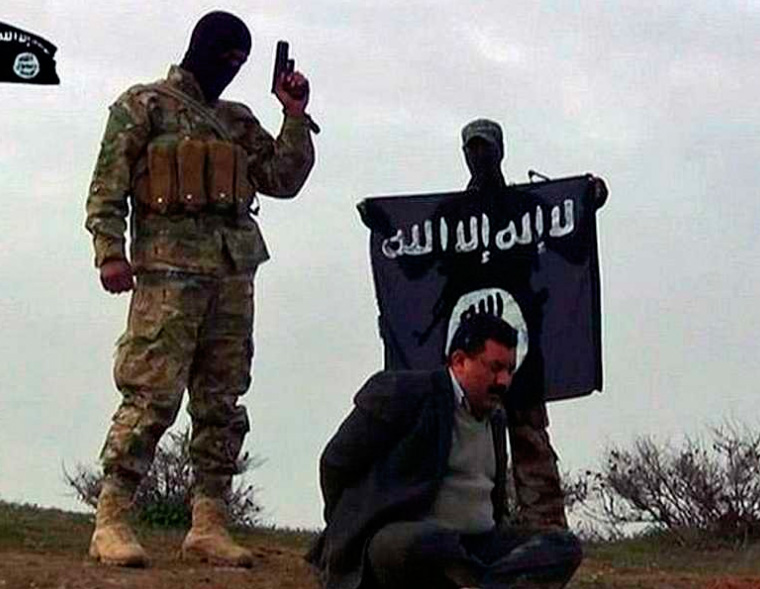Looking at the way the Islamic State of Iraq and Syria has now taken over roughly a third of Syrian territory, while also controlling a quarter of Iraq, I can’t help but see a strangely familiar scenario since this Islamic Caliphate has now been proclaimed.
Last week, I watched VICE News’ feature documentary, “The Islamic State,” a never-before-seen inside look at what society now looks like under ISIS’ rule. But much to my surprise, the most shocking revelation in this piece directed by English-Palestinian journalist Medyan Dairieh wasn’t what I expected. Images of religious police Hisbah patrolling the streets of the Islamic Caliphate “capital” of Raqqa, Syria, ordering a woman’s husband to have her change the fabric of her veil, or telling another man to grow his beard longer or face harsh punishment, and seeing prisoners about to get their hands cut off for stealing were too reminiscent of similar, abundant cases, such as Saudi Arabia’s Janjaweed.
No, the true surprise of this documentary came among the conversations Dairieh was having with the Sunni tribesmen now living under the Islamic Caliphate. A staggering number approved the change of regime, celebrating the fact that what they believe to be a legitimate theocracy replaced either a heretic Shia dictatorship (Bashar al-Assad’s Syria), or Nouri al-Maliki’s secular, US-controlled puppet state in Iraq.
Listening to those men instantly reminded me of an entirely similar story which unfolded 18 years ago in Afghanistan: the rise of the Taliban.
In the mid-1990s, Afghanistan was recovering from years of conflict against the former Soviet Union and was in the midst of a bloody civil war, with warlords fighting each other to fill the vacuum the Russians left behind them. Civilians were dying by the thousands. Around 1996 along came the Taliban, a group of Islamic students led by Mullah Muhammad Omar.
https://www.youtube.com/watch?v=bsCZzpmbEcs
Strongly influenced by a fundamentalist Islamic theology called Deobandi (close to Saudi wahhabism), they quickly took control over territories reaching far beyond their stronghold in Kandahar City, eventually pushing through and taking Kabul, claiming power over the country. Tired after years of war, Afghans saw the Taliban as a legitimate regime, a morally strong, pious group that brought order to chaos.
But Afghanistan’s honeymoon with the Taliban didn’t last long.
While remaining a conservative, religious society, Afghans weren’t used to the Taliban’s extreme brand of Sharia Law, having experienced a moderately modern, liberal society under King Zahir Shah’s 40-year rule between 1933 and 1973. The new rulers, being Sunni Muslims from the majority Pashtun ethnic group, minorities as well as Shia Muslims soon came under threat of ethnic cleansing, especially the Mongol-looking Shia Hazara people. Non-Muslims mostly fled, with one lone Jew still living in Kabul as of today. Shortly before their fall in 2001, they had started destroying non-Islamic historical treasures, most notably the millenia-old giant buddhas in Bamiyan.
The pattern with ISIS is quite similar – a group coming from seemingly nowhere, this one merged from various Jihadist factions operating in Syria and Iraq. They took power after fighting off regimes considered either corrupt or heretical to a majority of Syrians and Iraqis. They set up a strictly religious society based on an extreme version of Sharia.
But the biggest difference between ISIS and the Taliban is that ISIS is evolving into the societal monster that the Taliban became, but much faster. Only months after they declared the Islamic Caliphate, they have already brutally executed not only Syrian and Iraqi military officials, but also innocent Shia civilians and Yezidis, a Kurdish religious minority group, to the extent that they now face ethnic cleansing. They bully Christians into converting, paying a religious tax or having their heads cut off (or, in some documented cases, beheading recently converted Christians).
Already have an account? Sign In
Two ways to continue to read this article.
Subscribe
$1.99
every 4 weeks
- Unlimited access to all articles
- Support independent journalism
- Ad-free reading experience
Subscribe Now
Recurring Monthly. Cancel Anytime.
Also, ISIS mastered propaganda at a high-level.
In the late 1990s, Ahmed Shad Massoud’s Northern Alliance was the Talibans’s biggest threat. A Sunni Tadjik from Panjshir, Massoud was and still is upheld as a national hero who, were it not for his assassination 2 days before 9/11, could have been a unifying figure in a post-Taliban Afghanistan.
With these similarities in mind, lessons could be learned and applied in fighting ISIS.
(Featured Image Courtesy: Business Insider)










COMMENTS